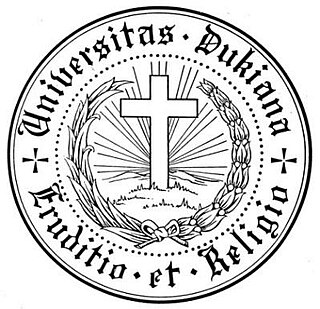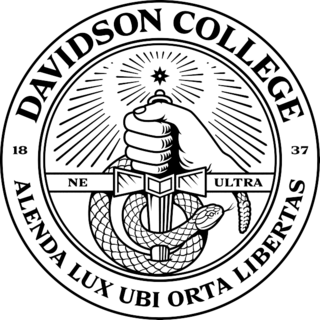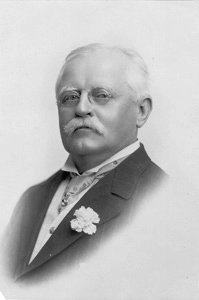
Duke University is a private research university in Durham, North Carolina, United States. Founded by Methodists and Quakers in the present-day city of Trinity in 1838, the school moved to Durham in 1892. In 1924, tobacco and electric power industrialist James Buchanan Duke established The Duke Endowment and the institution changed its name to honor his deceased father, Washington Duke.

Adelphi is an unincorporated area and census-designated place in Prince George's County, Maryland, United States. Per the 2020 Census, the population was 16,823. Adelphi includes the following subdivisions; Adelphi, Adelphi Park, Adelphi Hills, Adelphi Terrace, Adelphi Village, Buck Lodge, Chatham, Cool Spring Terrace, Hillandale Forest, Holly Hill Manor, Knollwood, Lewisdale, and White Oak Manor.

Durham is a city in the U.S. state of North Carolina and the county seat of Durham County. Small portions of the city limits extend into Orange County and Wake County. With a population of 283,506 in the 2020 census, Durham is the 4th-most populous city in North Carolina, and the 71st-most populous city in the United States. The city is located in the east-central part of the Piedmont region along the Eno River. Durham is the core of the four-county Durham-Chapel Hill, NC Metropolitan Statistical Area, which had an estimated population of 608,879 in 2023. The Office of Management and Budget also includes Durham as a part of the Raleigh-Durham-Cary, NC Combined Statistical Area, commonly known as the Research Triangle, which had an estimated population of 2,368,947 in 2023.

Research Triangle Park (RTP) is the largest research park in the United States, occupying 7,000 acres (2,833 ha) in North Carolina and hosting more than 300 companies and 65,000 workers. It is owned and managed by the Research Triangle Foundation, a private non-profit organization.

The Research Triangle, or simply The Triangle, are both common nicknames for a metropolitan area in the Piedmont region of the U.S. state of North Carolina. Anchored by the cities of Raleigh and Durham and the town of Chapel Hill, the region is home to three major research universities: North Carolina State University, Duke University, and the University of North Carolina at Chapel Hill, respectively. The "Triangle" name originated in the 1950s with the creation of Research Triangle Park located between the three anchor cities, which is the largest research park in the United States and home to numerous high tech companies.

Alpha Gamma Delta (ΑΓΔ), also known as Alpha Gam, is an international women's fraternity and social organization. It was founded on May 30, 1904, by eleven female students at Syracuse University in Syracuse, New York, and thus it is the youngest member of the Syracuse Triad of North American social sororities that also includes Gamma Phi Beta (1874) and Alpha Phi (1872). Since its founding, Alpha Gamma Delta has, as of December 2021, initiated over 201,000 members and installed 199 collegiate chapters and more than 250 alumnae groups.

Davidson College is a private liberal arts college in Davidson, North Carolina. It was established in 1837 by the Concord Presbytery and named after Revolutionary War general William Lee Davidson, who was killed at the nearby Battle of Cowan's Ford.

La Unidad Latina, Lambda Upsilon Lambda Fraternity, Inc. is a Latino-based collegiate fraternity. It was founded at Cornell University in Ithaca, New York on February 19, 1982, and has 75 active undergraduate chapters and fifteen graduate alumni professional chapters in universities and cities across the United States.

Julian Shakespeare Carr was an American industrialist, philanthropist, and white supremacist. He is the namesake of the town of Carrboro, North Carolina.
There are many collegiate secret societies in North America. They vary greatly in their level of secrecy and the degree of independence from their universities. A collegiate secret society makes a significant effort to keep affairs, membership rolls, signs of recognition, initiation, or other aspects secret from the public.

The Herald-Sun is an American, English language daily newspaper in Durham, North Carolina, published by the McClatchy Company.
Duke University Hospital is a 1048 -bed acute care facility and an academic tertiary care facility located in Durham, North Carolina, United States. Established in 1930, it is the flagship teaching hospital for the Duke University Health System, a network of physicians and hospitals serving Durham County and Wake County, North Carolina, and surrounding areas, as well as one of three Level I referral centers for the Research Triangle of North Carolina. It is affiliated with the Duke University School of Medicine.
John Sprunt Hill was a North Carolina lawyer, banker and philanthropist who played a fundamental role in the civic and social development of Durham, North Carolina, the expansion of the University of North Carolina at Chapel Hill and the development of rural credit unions in North Carolina during the first half of the 20th century.
The Eno River Unitarian Universalist Fellowship (ERUUF) is a Unitarian Universalist (UU) congregation located in Durham, North Carolina. In 2018, over seven hundred people were members of ERUUF, making it the largest UU congregation in NC and one of the largest in the UUA. It sponsors the UU campus ministry program at Duke University, Unitarian Universalist Fellowship @ Duke.
Duke Kunshan University is a university in Kunshan, Jiangsu, China. It was established in 2018 by a joint venture between Duke University and Wuhan University. The university is an independent legal entity.
Helen Gray Crotwell served as the Associate Minister to Duke University from 1973 to 1979. She had previously served as the associate director of the Duke Methodist campus ministry. During her time at Duke, she published a compilation of sermons written by women and participated as a campus minister in the Silent Vigil at Duke University. Crotwell was the first woman appointed as a district superintendent in the United Methodist Church in North Carolina and one of the first in the Southeast. She served as the chairperson of the Commission on the Status and Role of Women in the United Methodist North Carolina Conference and advocated for inclusivity and female empowerment in the church. Her major interests included women and the church, women and theology, counseling, and the church and social justice.

East Campus is part of Duke University's campus in Durham, North Carolina. East Campus, along with West Campus, make up most of Duke's main campus. The campus follows the Georgian architecture style, making it distinct from West Campus. Currently, East Campus is the exclusive residential home to first-year students. It borders Trinity Historic District to the east and Walltown Neighborhood to the north.

West Campus is part of Duke University's campus in Durham, North Carolina. West Campus, along with East Campus, make up most of Duke's main campus. The campus follows the Collegiate Gothic architecture style, inspired by the mid-18th century Gothic Revival style, making it distinct from East Campus. This was in a similar set-up as Cornell University's West Campus built a decade prior.

Walltown is a historically African-American neighborhood in Durham, North Carolina. The neighborhood is located between West Durham Historic District and Trinity Historic District, north of Duke University East Campus. Historically, the neighborhood was a working class neighborhood for African-American employees of Duke University and local tobacco and textile mills in Durham. Walltown was named after George Wall, a former enslaved person, who was one of the first people to purchase a lot in the area. Members of the community were active in the civil rights movement and desegregation in Durham. Since the beginning of the twenty-first century, Walltown has been undergoing gentrification.

The COVID-19 pandemic was confirmed to have reached the U.S. state of North Carolina on March 3, 2020.















